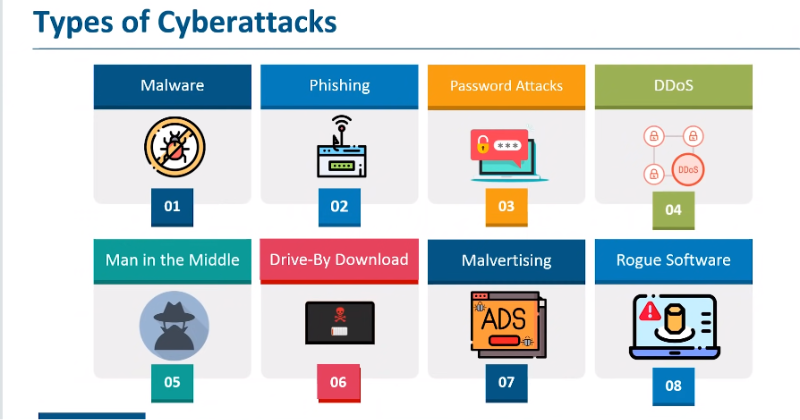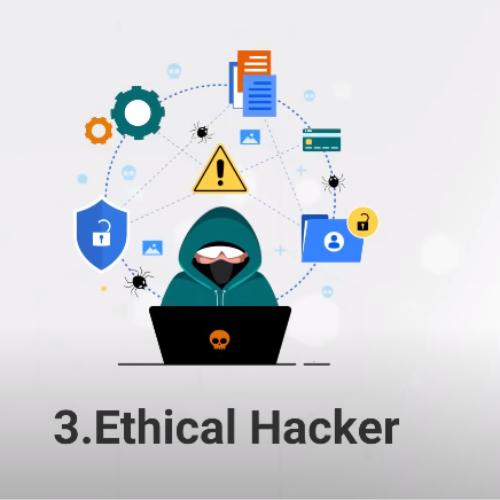Overview Of The Importance Of Data Security In Today’s Digital Landscape
Data security has become increasingly important in today’s digital landscape, where data breaches have become more common and sophisticated. These breaches can lead to sensitive information being compromised, such as personal identification details and financial data. This can result in identity theft, fraud, or even blackmail.
The importance of data security cannot be overstated. It is crucial for companies to prioritize the protection of their customers’ information by implementing robust security measures and protocols. This responsibility falls on the shoulders of data security associates who work tirelessly to secure networks and systems against potential threats.
The role of a Data Security Associate

The role of a Data Security Associate has become increasingly important. These professionals are responsible for ensuring that sensitive data is protected against unauthorized access, theft, or misuse. They work to develop and implement security protocols that keep data safe from cyber attacks and other threats.
Data Security Associate: A Lucrative and Fulfilling Career Choice
The Growing Demand for Data Security Professionals
Cyber Threats And Data Breaches

Rise In Cyber Threats And Data Breaches
This increase in cyber threats has also led to a higher demand for professionals who specialize in data security. A career as a Data Security Associate can be both lucrative and fulfilling, as they play a crucial role in protecting sensitive information from unauthorized access. They are responsible for identifying potential vulnerabilities in systems, implementing effective security measures, and staying up-to-date on the latest advancements in cybersecurity.
Increased Reliance On Technology And Data-Driven Decision Making
Businesses are using data to make informed decisions, identify patterns and trends in consumer behavior, and gain a competitive edge. As a result, there is a growing demand for professionals who can analyze and interpret data effectively. A career as a Data Security Associate can be both lucrative and fulfilling in this digital age.
Key Responsibilities of a Data Security Associate
Protecting Sensitive Data From Unauthorized Access
As a Data Security Associate, it is your responsibility to ensure that confidential information remains secure and protected from any form of malicious attack. There are several ways you can protect sensitive data, including using strong passwords, encrypting files and folders, regularly updating software, and implementing multi-factor authentication.
Conducting Risk Assessments And Vulnerability Testing
As a data security associate, it is necessary to identify potential threats and vulnerabilities that can potentially compromise the confidentiality, integrity or availability of sensitive information. Risk assessments entail identifying possible risks and evaluating their impact on the organization’s information systems. Vulnerability testing involves scanning the network for vulnerabilities and assessing how easily they can be exploited.
A thorough risk assessment helps in identifying areas where controls need to be strengthened or implemented. This process also identifies weaknesses in existing controls that may require additional attention. Regular vulnerability testing ensures that any new vulnerabilities discovered are remediated promptly before they can be exploited by attackers. By conducting these tests regularly, data security associates ensure that all systems within an organization are up-to-date with protection against known vulnerabilities.
Developing And Implementing Security Protocols
As a data security associate, developing and implementing security protocols is an essential part of your job. Your primary responsibility is to ensure that all sensitive information within your organization stays safe from unauthorized access or exposure. This means creating policies, procedures, and guidelines for employees to follow when handling sensitive data.
To develop effective security protocols, you need to have a clear understanding of the types of threats that pose risks to your organization’s data. You will need to conduct regular assessments to identify vulnerabilities in your system and come up with solutions that address these weaknesses. Additionally, it is crucial to keep up-to-date with emerging cybersecurity trends and new technologies as they can significantly impact the effectiveness of your security protocols.
Lucrative Career Opportunities
High Demand Leads To Competitive Salaries

Data security has become a top priority in the modern digital era, and as a result, job opportunities for data security associates have surged.
According to recent surveys conducted by salary tracking websites such as Glassdoor and Payscale, data security associates can earn an average annual salary of $80,000-$100,000 depending on their level of experience and expertise. However, these figures are just the tip of the iceberg when it comes to total compensation; many companies now offer sign-on bonuses or relocation packages to attract top talent.
Job Growth And Advancement Prospects
Data Security Associate is a lucrative and fulfilling career choice with great job growth and advancement prospects. The field of data security offers numerous opportunities for professional development and career advancement. With experience and expertise in the field, data security associates can advance to higher-level positions such as information security analysts or chief information officers. Additionally, many organizations offer training programs to upskill employees in new technologies, enabling them to take on more challenging roles within their organization.
Skillset Required for Data Security Associates
Strong Knowledge Of Information Security Principles
A career as a Data Security Associate requires a strong knowledge of information security principles. This includes the ability to identify and assess potential security risks, develop strategies to mitigate those risks and implement security measures to protect sensitive data. In addition, professionals in this field must stay up-to-date with the latest trends and technologies in cybersecurity.
Proficiency In Security Tools And Technologies
A Data Security Associate must possess an in-depth understanding of the latest security tools and technologies. This includes knowledge of firewalls, antivirus software, intrusion detection/prevention systems (IDS/IPS), encryption methods and techniques, network access control (NAC) solutions, and more. The ability to work with these advanced tools effectively is crucial for success in this field.
Moreover, proficiency in security-related programming languages such as Python or Java can prove beneficial while working on complex projects involving data protection and cybersecurity measures. A Data Security Associate should also be up-to-date with the latest trends in cybersecurity technology by attending seminars, and workshops or completing online courses regularly.
Analytical Thinking And Problem-Solving Abilities
Data security associates must be able to analyze complex information systems and identify potential vulnerabilities that could lead to security breaches. Therefore, having strong analytical skills is crucial.
Problem-solving abilities are also critical for data security associates as they must be able to troubleshoot issues quickly and effectively. This requires the ability to approach problems with a systematic mindset, evaluate different solutions based on their feasibility and effectiveness, and implement the best course of action promptly. Moreover, data security associates must continuously stay up-to-date with new technologies in cybersecurity as hackers often find innovative ways of breaching secure networks.
Educational and Professional Pathways
Relevant Degrees And Certifications

A degree in computer science or information technology can greatly benefit those pursuing a career as a data security associate. These degrees provide students with foundational knowledge of computing systems, programming languages, and network architecture. Additionally, certifications such as Certified Information Systems Security Professional (CISSP) or CompTIA Security+ validate an individual’s expertise in security protocols and practices.
Another relevant certification is the Certified Ethical Hacker (CEH), which demonstrates proficiency in identifying potential vulnerabilities within computer systems through ethical hacking techniques. This certification is particularly useful for those interested in penetration testing roles within the field of data security.
Importance Of Ongoing Professional Development
By participating in ongoing training and education programs, data security associates can stay up-to-date on the latest threats and techniques for preventing them.
Not only does ongoing professional development help data security associates stay current with industry trends, but it also demonstrates their commitment to their careers. Employers value employees who are willing to invest time and effort into improving their skills and knowledge. By staying ahead of the curve, data security associates can position themselves as valuable assets to any organization.
Ongoing professional development can lead to personal fulfillment by providing opportunities for growth and advancement. As data security professionals develop new skills and expand their knowledge base, they may find themselves qualified for leadership roles or specialized positions within their organizations. This not only provides a sense of accomplishment but also opens doors for higher salaries and greater job satisfaction.
Varied Work Environments
Opportunities In Various Industries And Sectors
One industry that is currently offering a wide range of opportunities is the data security industry. This has led to an increased demand for skilled professionals who can help safeguard sensitive data against unauthorized access or theft.
In addition to the tech industry, other sectors such as healthcare, finance, and government also require advanced data security measures due to the nature of their work. As a result, there are numerous job openings for data security associates across various industries. These roles typically involve analyzing existing systems and identifying potential vulnerabilities while recommending solutions to mitigate risk.
For individuals interested in pursuing a career in the field of data security, there are several paths one can take including obtaining relevant certifications or degrees such as Certified Information Systems Security Professional (CISSP) or Bachelor’s degree in Cybersecurity.
In-House Roles Vs. Consulting Positions
In an in-house role, you work for a specific company and become familiar with their culture, operations, and expectations. You may also have more stability in your job as you are not reliant on finding new clients to sustain your income. However, there may be less variety in the types of projects you work on.
On the other hand, consulting positions offer more diversity in terms of clients and projects. This can provide a higher level of excitement as well as experience working with different industries. Consulting also allows for greater flexibility in terms of schedule and location as many assignments can be completed remotely. However, there is a certain level of uncertainty associated with consulting work since it relies on securing new clients to maintain a consistent income.
Advantages of a Career in Data Security
Variety Of Roles Available:
From entry-level positions to management roles, there are various job titles that cater to different levels of experience and expertise. Moreover, companies across industries require skilled professionals capable of identifying vulnerabilities in their systems and implementing measures to prevent or mitigate potential breaches.
Job Stability And Security
As the world becomes increasingly digital, companies are more focused on data security than ever before. This means that jobs in the field of data security have become much more stable and secure. In fact, a career as a Data Security Associate can be both lucrative and fulfilling.
Diversity of Projects and Challenges
As a data security associate, you can expect to work on an array of projects that will challenge your skills and knowledge. These projects may vary in complexity and scope, from developing security protocols for small businesses to designing comprehensive cybersecurity strategies for large corporations. This diversity in project type means that your role will never be monotonous or routine.
In addition to working on different types of projects, you’ll also face unique challenges as a data security associate. One day, you might be troubleshooting network vulnerabilities or identifying potential threats within an organization while the next day, you could be implementing new software solutions or training employees on best practices for cybersecurity. The dynamic nature of the field ensures that each new challenge presents an opportunity to learn and grow professionally.
Collaboration and Interdisciplinary Work
An interdisciplinary approach is also needed in order to effectively address the complex issues associated with data protection. Given that cybersecurity touches on so many different areas of an organization—from financial reporting to customer privacy—it is critical for data security associates to be able to collaborate with colleagues from other fields in order to develop holistic solutions.
Working With It Teams, Management, And Stakeholders
Working as a data security associate requires close collaboration with various departments including IT teams, management, and stakeholders. It is important for data security associates to establish clear communication channels with these groups in order to effectively identify potential risks and implement appropriate measures to mitigate them. In working with IT teams, it is crucial for data security associates to have an understanding of the technical aspects of the organization’s infrastructure and be able to communicate any vulnerabilities or potential threats that may need attention.
In addition to IT teams, effective collaboration with management is also essential. Data security associates should work closely with management in order to ensure that policies and procedures are followed by all employees within the organization. This includes regularly conducting training sessions on best practices for information security, monitoring compliance with established protocols, and providing feedback on areas where improvements can be made.
Importance of Communication Skills
As a data security associate, having strong communication skills is vital for success in the field. This is because data security involves working with various stakeholders such as clients, colleagues, and management. Effective communication helps to ensure that everyone involved understands the risks and benefits of different approaches to data protection.
Communication also plays a crucial role in crisis management situations where swift and clear messaging can help prevent or mitigate potential breaches. In addition to verbal communication, written communication skills are also necessary for creating reports, policies, and procedures that clearly outline data security protocols.
Beyond technical expertise, employers seek candidates who possess strong interpersonal skills like active listening, empathy, and collaboration. These qualities help to build trust with clients and colleagues alike while fostering a culture of transparency around sensitive information handling practices.
Work-Life Balance and Flexibility
The field of data security often allows for flexibility in terms of work hours and even location. This flexibility can be incredibly beneficial for those who need to balance personal responsibilities with their career.
One way to achieve work-life balance as a data security associate is by taking advantage of remote work opportunities. With the right technology and communication tools, many tasks can be accomplished from home or another remote location. This option provides more time and freedom to manage personal commitments while still maintaining high levels of performance at work.
Another important aspect of achieving work-life balance is setting boundaries between professional and personal life. It’s easy for someone in the field of data security to get absorbed in their work, but it’s crucial to disconnect at certain times throughout the day. Setting specific times when you are available or unavailable for calls or emails outside your working hours will help maintain a healthy division between your professional and personal life.
Overcoming Challenges in the Field
One common challenge is keeping up with the constantly evolving technology and security threats. Cybercriminals are always finding new ways to breach systems, which means that data security professionals must stay updated on the latest threats and preventative measures.
Another challenge that data security associates face is balancing the need for strong security measures with maintaining user accessibility. Implementing stringent security protocols may protect sensitive data, but it can also make it difficult for authorized users to access information quickly and efficiently. This delicate balance requires careful planning and collaboration between IT teams and business units.
Dealing With Sophisticated Cyber Threats
The increasing sophistication of cyber threats has led to a rise in demand for professionals who can deal with them. As a data security associate, you will be responsible for protecting information systems from unauthorized access and maintaining the confidentiality, integrity, and availability of data. You will also assist in developing and implementing security policies and procedures.
To effectively handle sophisticated cyber threats, you must have a deep understanding of the latest security technologies and protocols. You should be able to identify potential vulnerabilities in an organization’s system and take proactive measures to prevent any attacks. Additionally, you need excellent analytical skills to quickly analyze complex data sets and identify patterns that may indicate an ongoing or impending attack.
Being a data security associate is not only lucrative but also fulfilling as you play a crucial role in protecting sensitive information from malicious attackers. With the ever-increasing need for cybersecurity professionals due to increasingly sophisticated cyberattacks, it’s no surprise that this career choice is becoming an attractive option for many people looking for job stability.
Iit is important to be well-versed in the regulations and laws governing data protection to ensure that organizations comply with them. Failure to comply can lead to serious consequences such as hefty fines, loss of reputation, and even legal action.
To excel in this career field, one should have an understanding of various regulatory frameworks such as GDPR, HIPAA, and CCPA. It is also essential to keep up-to-date with new developments and changes in the law that may impact how businesses handle sensitive information. As a data security associate, you will work closely with different departments within an organization to ensure that they are following all necessary rules and regulations.
Building a Successful Career
To build a successful career in data security, it is essential to keep up with the latest industry trends and advancements. This means staying informed about new technologies, techniques, and best practices related to information security. Additionally, networking with other professionals in the field can help you learn about job opportunities, stay up-to-date on emerging trends, and establish yourself as an expert.
Developing your soft skills can also play a crucial role in building a successful career as a data security associate. Effective communication skills are vital when working with clients or team members who may not have technical expertise. Being able to explain complex concepts in simple terms can help you provide value and build trust with your colleagues or clients alike.
Conclusion
Becoming a data security associate is an excellent career choice for those who are interested in technology and cybersecurity. With the increasing amount of sensitive information being stored online, there is a growing demand for professionals who can ensure that this data remains secure from cyber threats. As a data security associate, you will have the opportunity to work with cutting-edge technology and play an important role in protecting valuable information.
Furthermore, this career path offers excellent earning potential and opportunities for growth within the field. Many companies offer competitive salaries and benefits packages to attract top talent in the field of cybersecurity. Additionally, as you gain experience and expertise in your role as a data security associate, there may be opportunities to advance into more senior positions or specialize in specific areas of cybersecurity.
FAQs
What Qualifications Do I Need To Become A Data Security Associate?
Becoming a Data Security Associate requires a certain level of education and specific qualifications. Most employers require at least a Bachelor’s degree in Computer Science, Information Technology, or any related field. In addition, aspiring candidates may need to have certification in cybersecurity to be considered for the position. The most common certifications required by employers include CompTIA Security+, Certified Information Systems Security Professional (CISSP), and Certified Ethical Hacker (CEH).
Apart from formal education and certification, applicants for the role of Data Security Associate should have practical experience in data security operations. Employers look out for candidates with experience working with security software such as firewalls, intrusion detection systems, vulnerability scanners, and antivirus software. Additionally, being knowledgeable about network protocols like TCP/IP is essential.
Is There A Demand For Data Security Professionals Globally?
The demand for data security professionals is growing at an unprecedented rate, making it one of the most sought-after career choices globally. With the increasing number of cyber threats and data breaches, there’s a dire need for individuals with expertise in data security to protect sensitive information.
Data security professionals are required in every industry, including healthcare, finance, government agencies, and retail companies. They are responsible for designing and implementing security protocols to safeguard organizational systems from malicious attacks. The average salary for a Data Security Associate is $75,000 per year in the United States alone.
How Does The Role Of A Data Security Associate Differ From Other Cybersecurity Roles?
A data security associate works closely with IT teams to identify potential threats, monitor networks for suspicious activity, and implement security protocols that prevent unauthorized access. Unlike other cybersecurity roles, data security associates are more focused on preventing data breaches than responding to them.
Moreover, a data security associate typically has a broader skill set than other cybersecurity professionals. They need to possess knowledge of computer systems, network architecture, cryptography, and risk management. Data security associates must also be familiar with regulatory compliance requirements such as HIPAA or GDPR standards.
